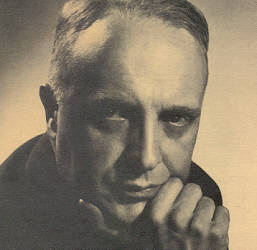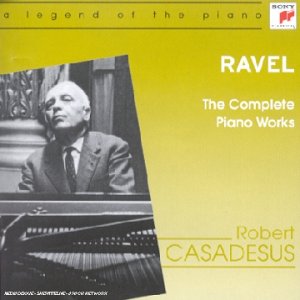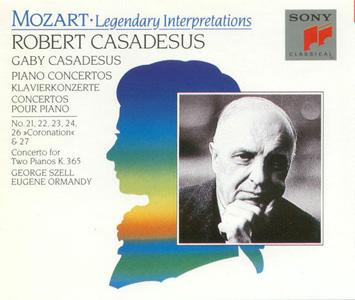| Music Home | Photo Gallery | Discography | Jacket Images | Korean |
* CASADESUS, Robert(7th Apr. 1899 ~ 19th Sep. 1972)
[ The endless fountain ]
1. Curriculum Vitae
 [ Left Photo
] Robert Casadesus(Photo; Sony Music Archive, 1953)
[ Left Photo
] Robert Casadesus(Photo; Sony Music Archive, 1953)
I think international fame likes words like brilliant technique, huge scale, power, masculinity, etc. Judging from these references, refinement, nobleness, and modestness tend not to be favored. Therefore, the incarnation of the words - Robert Casadesus is not generally known to the classical music listeners, but the gourmet of the routine baguette would understand his charm, I guess. In addition, even if inferior to Busch-Serkins, Casadesuses also is one of the most powerful art families in France, whose members are Henri(Robert's uncle, 1879~1947), Gaby(wife, 1901~99), Jean(son, 1927~72), Jean-Claude(nephew), and the most famous member is Robert, out of question.
Robert
is born at Paris. Henri, his uncle, was violist of
Quatour Capet who was one of the best string quartets
with Busch quartet, and founded The
society of ancient instruments with his families. He is always mentioned in
the history of the historical instrument performance.
Robert's aunt Rose taught him at first, and later Louis
Diémer(a pupil of Liszt, master of French piano school.
also taught Cortot)
at Paris Conservatory. There he met Gabrielle
L'Hôte(also Diémer's pupil), later married her in 1921.
He played with her for more than 50 years. She
abbreviated her first name as Gaby because he suggested
her so in watching their concert poster. In fact, 'Robert
et Gaby Casadesus' is much smarter than 'Robert Casadesus
et Gabrielle L'Hôte Casadesus' - considering their son
Jean later came in the team, in the point of the
effectivity of poster space.
He taught at American
Conservatoire at Fontainebleau near Paris, which was
founded by his uncle Francis. Later he became director. He was praised by Brahms' Concerto
No.2 with Toscanini and New York Philharmonic, after
which he periodically toured USA. At the break of WWII
and collapse of France by Nazi, he moved to America with
his conservatory. He contracted Columbia(now Sony
Classical) like Serkin and Busch, remaining the exclusive
artist of Columbia after the end of WWII, returning to
France. His activity at concert
and recording hall was enormous - his concert appearances
were more than 3000 by 1971.
His death came suddenly. In 1972, after
traffic accident robbed Jean of his life in Canada, he
passed away in Paris some months after. I guess Jean's
death was one of the cause - Can there be any parents
that will not be desparate if their promising son with
friendly term died in his mid-forties?.
2. His music
 His art is lucidity and
refinement itself. Any
recording of his is far from partial exaggeration and
useless complexity. I think Cortot is sometimes too
romantic, but that he is never. Light and well-sonorous
tone as well as the classical and stable interpretation
has his music neat and cool. The feeling of watching the
cool fountain in the mountain is his music.
His art is lucidity and
refinement itself. Any
recording of his is far from partial exaggeration and
useless complexity. I think Cortot is sometimes too
romantic, but that he is never. Light and well-sonorous
tone as well as the classical and stable interpretation
has his music neat and cool. The feeling of watching the
cool fountain in the mountain is his music.
His main repertoire were from French
baroque(Rameau) to Debussy and Ravel, incluing German
baroque and classic/romatic. His especially highly
acclaimed repertoires were Mozart and Ravel. The former
was well matched to his sophisticated touch, and his
classical grasp and perfect technique clearly explained
the classical inclination of the latter. One more - his
family team repertoire as duo(with Gaby) and trio(with
Gaby and Jean).
It is unfortunate that much amount of his
recordings are monaural, but pretty many by stereo. Most
of his available CDs recorded after his exile to America.
Solo works span from Bach to French
impressionism, I want to choose Debussy and Ravel,
complete set of which were recorded by 78s and LP twice. The Ravel set(1951) released
as the Sony Masterworks Heritage clearly showed his
classical style - really his
typical performance. Robert got acquainted with the
composer when young, whose works he often played in
concert. Ravel liked this young artist, and the score and
letters given by Ravel to him remain from now on. The
virtuosos like Gieseking, Casadesus, Richter, and Gulda never emphasize romanticism when playing
French 'impressionists', which has to be born in mind(I
feel somewhat uncomfortable when listening Cortot's
Debussy Preludes Book I because of the reason).
Only half of the Debussy set was released, in which
Preludes Book I & II are classical and straight also.
Interestingly, Beethoven and Schumann recordings are
pretty many, and the latter is stereo. He didn't confine
himself within French repertoire.
Concerto
recordings of Beethoven's Nos.
1, 4, & 5, Liszt's No.2, and Weber's Konzertstuck
exist, but most famous ones are Mozart series with George
Szell and Columbia
Symphony/Cleveland Orchestra in 1959~62. I know Nos.
12,15,17,18,20~24,26 and 27. Szell's leading is
transparent and sophisticated, and Robert's touch very
near to those of the traditional 'Viennese' Mozart of the
general concept. Szell's approach is more or less too
keen for me in a few works, it's certain that this series
is too
 French works are indispensible, of course.
D'Indy's Symphony on a French Mountain Air and Franck's
Symphonic Variations with Ormandy/Philadelphia orch. are
really fresh, beautiful, and have delightful tone. I
remind these recordings of the cold fountain at the top
of a mountain. Faure's Ballade and Saint-Saens Concerto
No.4 with Bernstein/New York po. are also good, but some
to be desired due to the background.
French works are indispensible, of course.
D'Indy's Symphony on a French Mountain Air and Franck's
Symphonic Variations with Ormandy/Philadelphia orch. are
really fresh, beautiful, and have delightful tone. I
remind these recordings of the cold fountain at the top
of a mountain. Faure's Ballade and Saint-Saens Concerto
No.4 with Bernstein/New York po. are also good, but some
to be desired due to the background.
Most of his chamber music recordings are
done with another Columbia artist, Zino Francescatti, who jointed with Robert from 1942 to 1972.
Sony international only released Beethoven's complete
sonata set(stereo), while French Sony all of his
recordings from 2001. The combi's recordings include
Brahms(3 sonatas), Fauré
Nos.1 & 2, Franck, Ravel,
and Debussy's. I guess they are not reissued because they
are monaural, but in this French repertoire their
splendid music really sparkles(I bought French local
releases at Japan except for Ravel & Brahms). In 78s
era, he recorded Fauré's Piano Quartet No.1(with Calvet sq.) and
Debussy's Cello Sonata(with Maurice Maréchal)
available only as French local, too.
I
cannot miss his family team's recordings. The recordings
of 4 hands or 2 pianos works with Gaby are
internationally available by Sony - Chabrier, Satie,
Debussy, R.Casadesus himself, and Fauré(Mozart
and Schubert are not internationally available yet). Of
course, they show very good ensemble by virtue of 50
years. In addition, Gaby said Robert played the low
register when they played 4-hand-works. At J.S.Bach &
Mozart's concertos for 2 or 3 pianos(with Ormandy and
Dervaux), I think Mozart is better.
I think his interpretation tendency is well abbreviated by Gaby. "My husband liked Mozart, but his best choice (as a masterpiece) were Beethoven's string quartets". He was the master of the French romantic and impressionism repertoire, but I have confidence in that his artistry was based on the classicism. Others will agree; his Ravel is more famous than his Debussy. Otherwize, he could not interpret Mozart so well(Cortot, the romantist, could NOT). In this respect, he is deserved to be called the classicist not frequently seen in French pianists. Beside Yves Nat whose favorite was Beethoven, perhaps he should be the best classicist in French pianist from now on.
Links
 The Casadesus - Robert
Casadesus page ;
Gréco, Robert's cousin, made his family's
homepage. Robert's section. Really, the Casadesus
are one of the best artist families in France.
The Casadesus - Robert
Casadesus page ;
Gréco, Robert's cousin, made his family's
homepage. Robert's section. Really, the Casadesus
are one of the best artist families in France. robertcasadesus.com ; Also by M. Gréco Casadesus.
Excellent, but website loading speed is not
stable. Discography is near perfect.
robertcasadesus.com ; Also by M. Gréco Casadesus.
Excellent, but website loading speed is not
stable. Discography is near perfect.- Radio France ; Robert Casadesus(French) - Briefing of his life.
- Colloque international ; Association Robert Casadesus & Observatoire musical Français, "Hommage à Robert Casadesus" ; Centennial colloquium of his birth in Sorbonne University.
(c) 2001~ , Youngrok LEE ; Link free, but please get my approval before you reuse, copy, or quote this materials.
| Music Home | Photo Gallery | Discography | Jacket Images | Korean |
Created ; 5th Jan. 2003
(Original
Korean page created ; 21st Oct. 2001)
Last update ;
15th May 2003